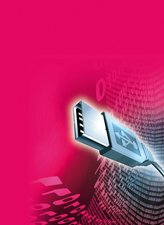Techniques for working with devices in Linux
Device Tricks

Linux is getting much better at managing devices, and the versatility of open source software leads to some interesting innovations.
Experts and beginners will tell you that devices are the perennial challenge of Linux systems. Linux is fast, stable, and safe – if you can get it to run on your hardware. We all have our war stories, but most users will affirm that the penguin's affinity for PC hardware is improving. Many of the device problems that plagued Linux systems in the early days were solved years ago. A Linux user from 1999 would be totally amazed to install a Linux system today and watch the system auto-locate the hardware. But maybe not all the hardware. Linux still has trouble with certain devices, and the lag time between the appearance of a new driver and its integration can mean a built-in driver isn't available for months.
This month's Device Tricks cover story starts with a study of some recent developments in driver management tools for Linux. Jon Masters describes some of the obstacles facing Linux developers and looks at some recent solutions that promise more seamless device support.
The next article in this month's set looks at a library of tools for supporting MTP-based devices such as music players and webcams in Linux. We'll describe some open source applications that support MTP, and you'll learn how to communicate with MTP devices from the command line. Next we examine the aufs2 stacked filesystem, which lets you add temporary write capability to a filesystem on a read-only device. The last article in the set shows how you can protect your privacy by encrypting the data on your USB sticks.
[...]
Buy this article as PDF
(incl. VAT)
Buy Linux Magazine
Subscribe to our Linux Newsletters
Find Linux and Open Source Jobs
Subscribe to our ADMIN Newsletters
Support Our Work
Linux Magazine content is made possible with support from readers like you. Please consider contributing when you’ve found an article to be beneficial.

News
-
Kernel 7.0 Now in Testing
Linus Torvalds has announced the first Release Candidate (RC) for the 7.x kernel is available for those who want to test it.
-
Introducing matrixOS, an Immutable Gentoo-Based Linux Distro
It was only a matter of time before a developer decided one of the most challenging Linux distributions needed to be immutable.
-
Chaos Comes to KDE in KaOS
KaOS devs are making a major change to the distribution, and it all comes down to one system.
-
New Linux Botnet Discovered
The SSHStalker botnet uses IRC C2 to control systems via legacy Linux kernel exploits.
-
The Next Linux Kernel Turns 7.0
Linus Torvalds has announced that after Linux kernel 6.19, we'll finally reach the 7.0 iteration stage.
-
Linux From Scratch Drops SysVinit Support
LFS will no longer support SysVinit.
-
LibreOffice 26.2 Now Available
With new features, improvements, and bug fixes, LibreOffice 26.2 delivers a modern, polished office suite without compromise.
-
Linux Kernel Project Releases Project Continuity Document
What happens to Linux when there's no Linus? It's a question many of us have asked over the years, and it seems it's also on the minds of the Linux kernel project.
-
Mecha Systems Introduces Linux Handheld
Mecha Systems has revealed its Mecha Comet, a new handheld computer powered by – you guessed it – Linux.
-
MX Linux 25.1 Features Dual Init System ISO
The latest release of MX Linux caters to lovers of two different init systems and even offers instructions on how to transition.
